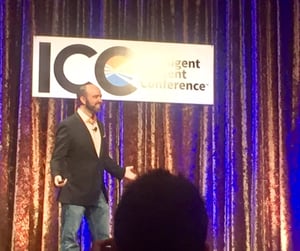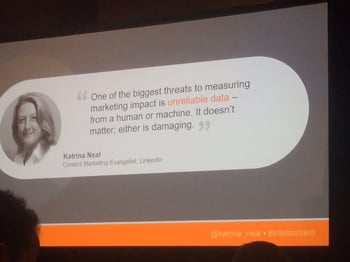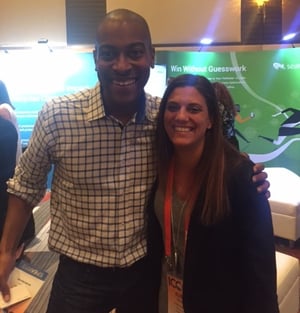Content marketing is about storytelling. This can make integrating new technologies into your content strategy seem like a daunting task—how can a machine express empathy? Will the automation of my content strategy make my content less human to the user?
These were some of the questions explored at the Intelligent Content Conference 2017 in Las Vegas, which aimed to discuss the future of content marketing and how technology and new techniques can change the way we produce and deliver content. While I learned a lot at the conference, kicked off by Joe Pulizzi of the Content Marketing Institute, three speakers really stood out to me for how they approached a content strategy. Here are a few of my top takeaways from content marketer Katrina Neal, content engineer Wil Reynolds, and author Fran Lebowitz.
“The Rise of the Data Scientist,” Katrina Neal
As a marketer, Katrina Neal has explored the science of marketing analytics and how they can lend a hand to evidence-based decision making. She cited unreliable data as the biggest threat to measuring marketing impact and used this to explore the role that data scientists can have in content marketing.
Neal began her discussion with the frightening statistic that 80% of CEOs don’t trust marketers, who often approach decisions with an “I think” mindset, rather than being able to say “I know” because of data. She encouraged marketers to become their own head of experimentation, using A.B testing as basic data scientists. Neal also recommended becoming a champion for hiring a data scientist, who can become critical for the creation, planning, and measurement of content moving forward.

There is an abundance of tools out there to help marketers acquire data to determine their return on marketing investment, like Intelligence Content Conference 2017 sponsors Brightedge and Searchmetrics. Using tools like these, marketers use data to focus on being predictive marketers.
“Optimizing search user experiences,” Wil Reynolds
For the user, the content you produce is an answer to a problem—the key takeaway from Wil Reynolds’ talk on optimizing search user experiences, where he delivered a wake-up call for content marketers focusing on search engine optimization. “Take time to understand the people behind the searches,” Reynolds advised as he discussed the tools and tricks available to build content with searcher’s problems in mind.
Reynolds showed videos of people searching for something and giving their opinions on the search results to highlight that several factors determine what people click on. By focusing on the intent of the user, marketers can build content that is optimized for the user’s intention, rather than a Google ranking. To do this, Reynolds recommends avoiding irrelevant head terms in favor of the long-tail searches that Google suggests in the drop down menu as you search.
“You want to be thanked, not just ranked.”
Closing Keynote, Fran Lebowitz
The Intelligent Content Conference 2017 ended with an interview with author Fran Lebowitz, which was described by “state of media and journalism…and frankly, whatever else she wants to discuss.” Despite the theme of the conference—how technology and storytelling can come alive in content marketing—Lebowitz admitted that she doesn’t own a computer or smartphone, nor does she use email or social media. She even chastised email for creating a culture of people who never stop working but never get anything done.
This might seem odd, to end a conference to heavily focused on technology with a speaker that has an aversion to using technology. However, Lebowitz encouraged the audience to become the expert in their field. She highlights her current book—which she joked that she signed a publishing contract for before the majority of the audience was born—as an example of how content only matters if you have something interesting to say.
“You know what content used to be called before all these machines? Life.”




